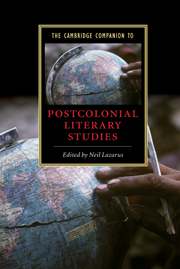Book contents
- Frontmatter
- 1 Introducing postcolonial studies
- Part 1 Social and Historical Context
- Part 2 The Shape of the Field
- 5 Postcolonial literature and the Western literary canon
- 6 Poststructuralism and postcolonial discourse
- 7 From development to globalization: postcolonial studies and globalization theory
- 8 Reading subaltern history
- 9 Temporality and postcolonial critique
- Part 3 Sites of Engagement
- References
- Index
- Series List
9 - Temporality and postcolonial critique
from Part 2 - The Shape of the Field
Published online by Cambridge University Press: 28 August 2006
- Frontmatter
- 1 Introducing postcolonial studies
- Part 1 Social and Historical Context
- Part 2 The Shape of the Field
- 5 Postcolonial literature and the Western literary canon
- 6 Poststructuralism and postcolonial discourse
- 7 From development to globalization: postcolonial studies and globalization theory
- 8 Reading subaltern history
- 9 Temporality and postcolonial critique
- Part 3 Sites of Engagement
- References
- Index
- Series List
Summary
How does time signify in postcolonial analysis? This question has occasionally been taken up as a matter of deciding the status of the prefix “post.” Theorists who approach the question in this way have answered it by periodizing the postcolonial - that is, by situating it in epochal terms, relative to such other putative eras as the colonial, the modern, the postmodern, and so on (Appiah 1991; Hutcheon 1994). Since the attempt here has been to separate the postcolonial from these other epochs or eras (to specify when it emerges and its distinctive constituent features as an epoch), this approach has usually emphasized nominal and categorical rather than conceptual or epistemological issues.
The periodizing approach to the question of time in postcolonial analysis has generated some thought-provoking insights. Its weakness, however, is that it has tended to eschew larger philosophical meditations on what makes epochal pronouncements intelligible in the first place (e.g., explorations of how time has figured in the analysis of the postcolonial). Temporality has been explored rather more fruitfully in postcolonial studies by approaches that regard the postcolonial not as an epoch or age but as a particular mode of historical emergence. Here, the issues have entailed characterizing the “alterity” associated with postcolonial forms of being; in other words, the focus has been on the ways in which, and the degree to which, the postcolonial has been taken to represent an “other” time whose logic and historical expression are incommensurable with the normative temporality of clock and calendar associated with Western modernity. What follows is a discussion of such lines of enquiry into time.
- Type
- Chapter
- Information
- The Cambridge Companion to Postcolonial Literary Studies , pp. 162 - 180Publisher: Cambridge University PressPrint publication year: 2004
- 18
- Cited by



